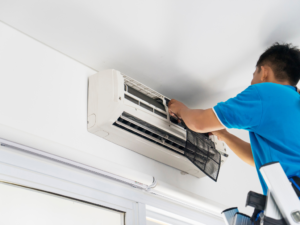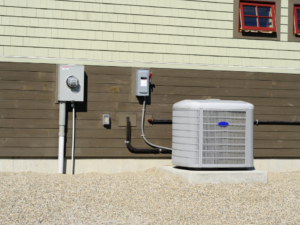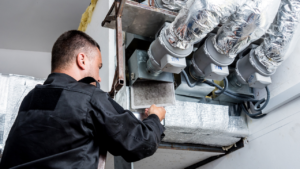Heating replacement is an important home improvement project that can save you money and enhance your comfort. Heating systems are essential to keeping your home warm and comfortable during the cold winter months, but they often break down or become outdated over time. Replacing your heating system with a newer, more efficient model is a great way to reduce energy costs while improving the overall comfort of your home. The heating replacement doesn’t have to be complicated or expensive – with the right information and guidance, you can choose the perfect heating system for your needs without breaking the bank. In this guide, we’ll cover all aspects of heating replacement so you can make an informed decision about what’s best for you and your family.
Heating Replacement: What to Consider Before Making a Decision
Heating replacement is an important home improvement project that can save you money and improve the comfort of your home. When considering a heating system replacement, there are several factors to consider before making a decision. These include the size of your home, the type of fuel source needed for the new system, energy efficiency ratings, warranties and maintenance requirements. Understanding these elements will help you decide which model is best suited to meet your needs while also saving money in the long run.
Understanding Heating System Types and Efficiency Ratings
Understanding Heating System Types and Efficiency Ratings is a key factor to consider when replacing your heating system. There are a variety of heating systems available, ranging from traditional gas furnaces and boilers to electric heat pumps and geothermal systems. Each type of system has its own unique advantages and disadvantages in terms of energy efficiency, cost, installation requirements, maintenance needs, and other factors. To ensure you select the best system for your needs, it’s important to understand the various types of heating systems available as well as their associated efficiency ratings.
Gas furnaces are one of the most common types of heating systems used in homes today due to their cost-effectiveness and efficient operation. Heating efficiency for gas furnaces is measured by an Annual Fuel Utilization Efficiency (AFUE) rating which tells you how much energy will be converted into heat rather than lost in the form of exhaust gases or wasted energy from the combustion process. The higher the AFUE rating on a furnace, the more efficient it is at converting fuel into usable heat for your home. Electric heat pumps are also an efficient option for providing heat to your home by using electricity instead of natural gas or propane to generate warmth. However, electric heat pumps require more energy to operate than gas furnaces so you should factor this additional cost into your decision making process when selecting a new system. Geothermal systems provide an even more efficient option but also come with higher installation costs due to their complexity and underground installation requirements.
Each type of heating system may also have additional features such as variable speed motors or advanced air filtration that can further increase its efficiency rating or provide additional benefits such as improved air quality within the home. Understanding each type of heating system as well as their associated efficiency ratings can help you make an informed decision about which model is best suited to meet your needs while also saving money in the long run.
The Benefits of Heating Replacement: Saving Money and Improving Home Comfort
Replacing a home’s heating system can have many benefits, both in terms of saving money and improving home comfort. Heating replacement is an important home improvement project that can help reduce energy costs and increase the overall comfort of your home. By replacing an outdated or inefficient heating system, homeowners can save up to 30% on their energy bills each month. Heating systems with higher efficiency ratings are better at converting fuel into usable heat, reducing the amount of energy lost through exhaust gases or wasted in the combustion process. Additionally, newer models often come equipped with advanced features such as variable speed motors or air filtration systems that can improve indoor air quality and reduce allergens in the air.
In addition to saving money on energy bills, heating replacement also improves home comfort by providing reliable warmth throughout the home during cold weather months. Heating systems with higher efficiency ratings are more effective at distributing heat evenly throughout each room of your house, creating a comfortable environment for everyone living in the space. Newer models also include advanced features that allow you to customize temperature settings so you can keep specific rooms warmer or cooler than others as needed. Heating replacement is an investment that pays off over time with consistent energy savings and improved home comfort levels for years to come.
Heating Replacement Costs and Financing Options to Make It Affordable
Heating replacement is an important home improvement project that can help reduce energy costs and improve the overall comfort of your home. However, replacing a heating system can be expensive and often requires financing to make it more affordable. Fortunately, there are various financing options available for homeowners looking to upgrade their heating systems including government incentives, energy-efficient mortgages (EEMs), and special offers from local utility companies.
For those with limited finances, government incentives such as tax credits or rebates may be available for purchasing new high-efficiency Heating Systems. These incentives vary by state but typically cover up to 30% of the cost of installation or equipment purchases making Heating Replacement much more affordable. Additionally, some utility companies offer discounts on Heating System upgrades when you sign up for certain service plans or purchase specific models through them. OEMs are also an option if you’re considering buying a new home in addition to upgrading your Heating System since they allow buyers to finance the cost of installing Energy Star-rated products into their mortgage loan amount which reduces monthly payments over time while providing immediate savings on utility bills each month.
Heating Replacement Services: Professional Installation for Maximum Savings
Heating replacement is an important home improvement project that can help homeowners save money on energy bills and improve their overall comfort levels. Professional installation of a Heating System ensures that the system is properly installed, which maximizes the efficiency of the Heating System and helps to reduce energy costs in the long term.
When it comes to Heating Replacement, professional installation services are essential for achieving maximum savings on energy bills. Professionals have experience installing Heating Systems and understand how each component works together to create a reliable and efficient heating system. They also use high-quality materials when installing Heating Systems so they last longer while providing consistent warmth throughout your home during cold weather months. Additionally, professionals know how to best configure your new Heating System so it distributes heat evenly throughout your house while using as little fuel as possible which helps you save even more money over time.
Smart Heating Technologies to Maximize Efficiency and Comfort
Heating replacement is an important home improvement project that can help reduce energy costs and improve the overall comfort of your home. But with advances in technology, Heating Systems are now available with smart features to further maximize efficiency and comfort levels in homes. Smart Heating Technologies use sensors, wireless communication systems, and automated heating controls to provide the highest level of temperature control while saving on energy bills at the same time.
Smart Heating Technologies allow homeowners to customize their Heating System settings from anywhere using a smartphone or tablet app. This allows them to adjust temperatures for specific rooms or times of day based on individual preferences. Additionally, these technologies also have motion sensors which detect when no one is present in a room then automatically lower temperatures until someone returns so you’re not wasting energy heating empty spaces unnecessarily. Some models even come with built-in humidity monitors that let you know when it’s too humid indoors so you can make adjustments accordingly. All these features combined create an efficient Heating System that provides maximum comfort while helping homeowners save money on their monthly utility bills as well.
Heating System Maintenance Tips for Long-Term Reliability and Performance
Heating System maintenance is essential in order to ensure that your Heating System continues to perform optimally and reliably over the long-term. From regular filter changes to scheduling annual tune-ups, there are a number of ways to keep your Heating System running efficiently and reduce energy costs year after year.
Regularly changing air filters is one of the most important Heating System maintenance tasks for homeowners. Air filters should be changed every three months or more often if you have pets or allergies as dirty filters can reduce airflow and cause your Heating System to work harder which leads to higher energy bills.
Additionally, it’s also important to check vents around your home periodically for debris build up which can block airflow from reaching certain areas in your house causing temperatures in those rooms to be colder than others. Lastly, having an HVAC professional come out annually for a Heating System tune-up ensures that any potential problems are caught before they become expensive repairs down the line while keeping all components working at peak efficiency throughout the entire heating season.
Conclusion
Heating replacement is an important home improvement project that can help reduce energy costs and improve the overall comfort of your home. With advances in Heating System technology, homeowners now have access to Smart Heating Technologies that provide maximum temperature control while saving on energy bills at the same time. Additionally, regular Heating System maintenance such as changing air filters regularly and scheduling annual tune-ups are essential for ensuring long-term reliability and performance from your Heating System which will keep your energy costs low year after year. By following these tips you’ll be able to maximize both efficiency and comfort levels in your home without breaking the bank.




